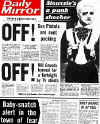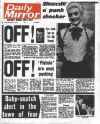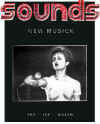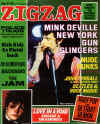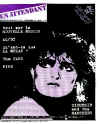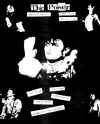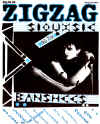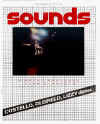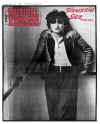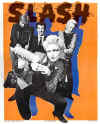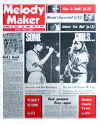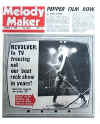|
In defence of Siouxsie and the
Banshees
"Have a competition in the
NME. In less than a hundred words, what do they get out of
Siouxsie and the Banshees? (Siouxsie Sioux)
"Everyone wants something
more out of their lives. To be true to themselves or
whatever. It's just that some people realise it and some
don't" (John McKay)
"I think that people have
got to face themselves eventually... the whole of society's got to face
itself. Not that we're going to achieve that... but we're gnawing
away at the bottom." (Steve Severin)
"We have a responsibility
to ourselves... we are facing up to our problems that should cross over
to other people." (Kenny Morris)
I woke up one morning and decided
to travel up to Liverpool to see Siouxsie and the Banshees play a
rearranged date at the University.
I travelled back down to London
with the unit and talked with them. Recalcitrant Sioux, reasonable
Severin, thoughtful Morris, cool McKay.
They are not as difficult or dour
in conversation as is generally maintained, but they are wary,
intent to some extent on keeping mysteries intact. Only about the
most trivial things are their answers definite. Deeper probing,
such as asking them to be specific about a certain song, draws a guarded
response: "From the listener's point of view, you don't want
to rob them of using their imagination - and if you're saying, 'This
song is about a boy next door', then the listener doesn't have to
ponder."
"We don't read a
newspaper. We step into it the way we step into a warm bath.
It surrounds us, it environs us in information." (Edmund
Carpenter)
SIOUXSIE: "I never used
to read the music papers that much when I was younger. I used to
buy certain people's records that like - I never really went by anything
that critics wrote. I just used to buy records. I just hope
that that's the same today, but somehow I don't think that it is.
I think it has changed quite a lot."
The most popular and pungent rock
journalist of modern times poetically murdered Siouxsie and the
Banshees' debut album "The Scream" with vindictive
venom. Remember? In this very paper...
Siouxsie: "On one level
it got me angry because people who had never seen or heard us would take
that review as gospel - and that's where the danger is.
"If someone said something
genuinely constructive but heavily critical - and on reasonable grounds
- it would sink in a lot more. I wouldn't just think they were
being stupid for no reason at all. I'd probably question it with
myself. But whether I'd change is a different thing...
"The only thing you can say
to someone like that is, 'well, if you hate so much of what is around
you, and you're noticing everything that is wrong, why aren't you doing
anything?' Why isn't she? She slags everything off, why
isn't she doing something for the kids? She's not doing anything
being a journalist, just being negative."
The curtain drops on that, for
now. But generally the Banshees claim to feed off their adverse criticism.
"However it's
motivated," spits Siouxsie, "it has added to us becoming
stronger."
"'The critics' apathy or
stupidity has supplied us with strength," Kenny Morris adds.
"The press is just a symptom
of everything we see around us," offers John McKay.
"They're not the reason we started, obviously, but they're a
symptom."
It's ludicrous that we should be
enemies.
SEVERIN: "We needed the
press to sustain interest whilst we had no record deal, which was
frustrating but the only way. Before we got the deal it got bad,
we were so desperate it got as close as - on the record - signing to the
BBC for them to release the John Peel tapes legitimately as an EP and -
off the record... (buggering about with 'legal' bootlegs)...
But it's not surprising to see,
now that we're in with Polydor, why it took so long for us to get
signed. There was nothing heavy about it. They never go and
see gigs.
"And a company like that has
only got ten bands to sign a year, so they have to be careful.
They didn't sign us until they were absolutely convinced that we were
going to make lots of money for the. And even then they were
hedging their bets a bit."
Morris: "We needed, or
wanted to work from within a big record label. It's probably been
said before - it's just the idea of taking a big record company to
progress, to work through, otherwise you'll probably fall short all the
time. We wouldn't be able to do as much as we want to."
McKay: "Public attitude
will never change, if the big record companies never change.
Because the A&R men won't sign up the right bands. So you've
got to change the big record companies before anything else, which is
what we're better able to do.
"At first Polydor thought
that we were a bit of a joke, like always asking for things. They
didn't really think we were serious, that it was just our
'gimmick'. But they soon realised that it's something that we're
going to carry all the way through. Keep hassling them for little
bits and details."
Morris: "As far as
control goes, we can ask them to do things and pressurise them to do
things, but it's like constantly swimming against the tide.
Because they just hold you back all the time. We have to be at
Polydor a lot of the time, pushing them and repeatedly telling
them to do things."
McKay: "Yeah, it's
enough to make you crack up. But hopefully the tide will
change. Once they realise and start to move with us, things will
be a lot easier.
"And it's the same with the
press. To a certain extent, so many people who interview us think
that they've got a nut to crack. It's like a bit of a chip on each
individual's shoulder, it's their aim in doing something. They
have got to have a nut to crack, rather than go with us."
Severin: "But as far as
Polydor goes, the success of 'Hong Kong Garden' brought them over a
bit."
It was no surprise that "Hong
Kong Garden" should spiral into the charts just weeks after the
group became Polydor people. The mystery and enigma of the single,
coupled with the similarly seductive reputation of the group itself
immediately landed it with plays on the radio. Its oriental
'authenticity', its flickering eroticism, its simple beauty pushed it
deep into the charts.
People really did care! the
Banshees really were that subtle! That observant! That good!
The single's success gave the
group a perfect base to develop from - a total, laughable contrast to
their isolated position just a few months before.
The group themselves viewed it
with wry detachment, even their natural excitement kept in check.
Severin: "That was
freaky. A very strange period. We'd finished it a month
before it came out, and we'd pushed it away - and it was just a very
strange feeling having people rush up and say how great it was. We
were working on the album at the time, so we didn't have much time to
think about it, except every Tuesday we'd look at the new
charts..."
Siouxsie: "I was
excited at the time."
McKay: "But the silver
disc was like one of those gold stars - you get a pat on the head and a
little gold star like at primary school. It was a bit
ridiculous. They were going to present it, but we refused any
presentation.
"It's a pretty bizarre thing
to have. It doesn't mean anything to what we're doing, it's just
part of the record company clockwork machinery. It keeps them
happy."
Severin: "it's funny
thinking that 250,000 people have got 'Hong Kong garden' in their
homes, It just meant to us that a lot more people were going to
buy the album."
"In expressionism we move
into a world of sound that presents a reverse situation to
Impressionism's muted dissonance, transparent textures, low level of
dynamics (certainly extreme contrasts in dynamic range) and harmonic
invention charged well nigh explosively with explicit tension (i.e. high
rate of dissonance). Expressionism in its own remarkable way
involves the listener in the sound it makes." (Donald
Mitchell)
THREE, FOUR months after the
single drifted out of the charts, the heavily anticipated "The
Scream" appeared, a jagged, jarring album in bleak contrast to
"Hong Kong Garden".
the music on "The
Scream" is unlike anything in rock. It is not, as some would
say, chaotic - it is controlled.
Each instrument operates within
its own space, its own time, as if mocking the lines of other
instruments. Known rock is inverted, leaving just traces of
mimickry of rock's cliches - satire that often bursts with glorious
justification into shaking celebration (as on "Helter
Skelter").
It is easy to gain attention by
doing something which is crudely obviously out of the ordinary, but the
Banshees have avoided such futile superficialities; it is innovation,
not revolution, not a destruction but new building. It has grown
out of rock - Velvets, "Station To Station", Bolan.
And Siouxsie's staggering voice is
dropped, clipped, snapped prominently above this audacious musical
drama, emphasising the dark colours and empty, naked moods.
Severin: "We can always
fit into the ordinary level of things, but there's most of the music
comes from something else, basically all the alternatives, and that's
the way I want it to be really. (Far out, man - Ed.)
Y'know it looks like a rock album, and I like it to look like a rock
album, I like it to look flash, I want it in the racks next to
Sham. I don't want it in Rough Trade for twice as much as it
should be.
"There's four very powerful
egos in this band, so I'm certainly not going to sit back and just play
a rhythm, like Eno's theory of the anchor bass and drums."
Morris: "All the
instruments do integrate together as a total thing, but at the same time
they're all as individually strong as they can possibly be.
"You have to maintain that
line between the traditional and the unconventional all the time.
But I can't see us slipping and producing something traditional."
McKay: "If we were
going to slip we would probably have the next album written
already. But every song that I come up with lately, I think, no,
it's no good, it's 'normal'. I just come out with things
with my fingers and they just don't sound any good, so you wait and
chuck out all those things that 'normal' bands would keep. And
maybe the day I feel that I've passed my peak is the day I start
accepting those things... or the rest of the band do...
"The new songs are being
written with the studio in mind. At first the studio was frustrating
for us because we all knew how the songs were going to sound and that limited
us, but I can already hear how the new stuff is going to sound in the
studio and that's really intriguing. We can't wait to do demos of
the new songs, just to fiddle about and experiment in the studio.
"But I still don't think that
this kind of thing will lead us into any sort of self-indulgence.
I couldn't see us finding a tape loop and fiddling about with
that. That's not the way to work."
Severin: "it's a
constant struggle with bass, drums, guitar to get a reasonable sound
together. It's been used for so long, that set-up. But it's
a definite decision of ours to use that set-up, the most orthodox
set-up, and to manipulate it as much as we can, rather than, say, bring
in a synthesizer.
"That's how we feel
now. Maybe when we've pushed this as far as we can we'll go into
some other areas."
McKay: "But i don't
like to separate the words from the music. And the way we put
songs together, I can't really look from just one angle. If it
wasn't for the words it wouldn't be worth bothering. And you can't
get away from the sounds of those words that Sioux is singing - even if
you're not taking in the actual meanings of the words, it's just the
sound."
Severin: "What we're
trying to do with the music is what we're trying to do, not necessarily
with the English language, but certainly with the rock lyric: just
tear it apart and put it all back together again in different
pieces. Because we live everyday with the English language and we
can't achieve that as well as we can with the music."
THE WORDS on "The
Scream" blend the disquieting deadpan style of Ballard with the
colourful conveniences (Musical toilet rolls? - ed.), of Bowie
and Bolan. The words glare and glitter.
The landscapes they scourge and
swab are those of the living room and of the mind; the same thing -
confinement. The music reflects this private, clinical landscape,
the tensions and eurphorias of day to day living. There is a
twisted passion, but no compassion, and that really is unnerving; the
record's fragments seem almost a clam before the storm - which can be
seen as being the album's final track "Switch", where even a
mental breakdown is dispassionately detailed, Siouxsie's voice grossly,
offensively parodying mental collapse.
The group are aware of the
futility of most means of 'relief' from boredom, which fail to bring to
life that while person - his deeper feelings, his imagination - like a
bulky food without any nutritional value. The person continues to
feel empty and unmoved in a deeper level, anaesthetising this
uncomfortable feeling by momentary excitation: 'thrills', 'fun',
'liquor' or 'sex'.
The boredom remains: a
boredom that can erupt into violence, aggression, suicide, breakdown,
perversion. This is what the Banshees depict, slanted from the way
they themselves were brought up, mundanely 'comfortable' and middle
class. Their use of "Helter Skelter" in this is
crucial: "When I get to the bottom I go back to the top of
the slide" - roll the boulder up, roll the boulder down...
The album took two years to come
together, and its timing was perfect. If it had been attempted six
months earlier it would not have been so vivid.
"You have to do
something", says John McKay, when I ask what motivates the
Banshees. "Write music or something."
Morris: "As far as I
can remember I always had to be doing something."
Severin: "Also, we feel
people have fucked rock up so much - this whole genre and everybody's
pissed it up. And I care about it because it means so much to so
many young people. It did to me. Everything I wanted when I
was young I'm trying to push into this band."
Morris: "The basic need
to create is an obsession with us."
That the Banshees have
successfully utilised the basic unconscious desire of the intense
revolution of '75/76, to inspire something positive out of boredom
(literally), is significant.
"The Scream" also seems
to focus and capture the last three years' chaos and concern.
Yet the Banshees are often used as
an easy example of how 'punk' destroyed itself, by people who ignore
both what the Banshees are trying to do and say, and how they're trying
to do it - by allowing themselves to become absorbed into the mainstream
or operate from within and use its advantages to communicate.
The fact is the Banshees, an
openly populist and accessible group, are at the head of a whole horde
of new rock groups who take risks unimagined three years ago, who use
access astutely and advantageously, who remain underivative and
ambitious.
What
'punk' was reacting against was sterility and narrow-mindedness. A
revolution like '75/76 can only by its very nature happen once in a
while, and it seems unforgiveable that everyone should ignore the true
diverse, exciting effects of the commotion and rummage about instead for
a constant state of revolt and orgy.
the Banshees always insisted that
they wanted to be successful, and have always understood that if they were
successful they'd be so for the wrong reasons. They chose the way
they wanted to go long ago.
They are not elitists -
"except in our influences about our music, about who we choose to
play with us."
Siouxsie: "We're not
setting ourselves up as perfect. We're affected by things that
other people are affected by, of course we are - and we're going to be
affected by other things as we develop. It's just that you've got
to realise that you have been affected, and if you can, you can
usually get yourself out of that nasty situation."
Severin: "We've had old
fans on this tour who've said they don't like the new audience because
they've only come for the single, but we love that. And we love
playing the single every night. Although I can understand people
do get precious."
Morris: "We've never
been dictated to by modes of music or modes of the times or the press,
and that's something we've strove for from the beginning, and we've got
a strong hold on that."
Severin: "What we've
tried to do is not only confined to music and how we treat the
press. Like we booked the whole of our last tour. We didn't
go with Goldsmith or anyone. So, for instance, we have our own
security guys, we tell the Top Rank people what not to do, where not to
go - things like that. We try to be effective in as many areas as
possible... and it's tiring."
Siouxsie: "I am
personally not deluded by the fact that what I'm doing is going to
change the world or anything like that. Which adds to the
frustration of carrying on, doing things that I want to do but realising
that you're doing something and it's just for a small percentage of the
world..."
McKay: "But that
percentage grows with each little revolution - like punk was the last
one - it grows all the time, the number of people who are prepared to
listen to something more political. A little bit more of the
population are willing not to go out and have a good time and hide all
the rest of their personalities in the back of their brains, so they
don't have to think about anything... who just listen to Travolta or
whatever and never think about it."
Morris: It never occurs to
me in that sense. It's just like a personal strength that we are
trying to build within ourselves, and we're trying all the time, and
that's going over to people's ears."
Siouxsie: "We're
learning that there's more to learn."
"One must be convinced of
the infallibility of one's own fantasy and one must believe in one's own
inspiration." (Arnold Schoenberg).
"Sensitivity towards
destructiveness/cruelty is rapidly diminishing and necrophilia, the
attraction to what is dead, decaying and lifeless and purely mechanical,
is increasing throughout cybernetic society. The spirit of
necrophilia was first expressed in literary terms by F. T. Marinetti in
his Futurist Manifesto in 1909. The same tendency can be seen in
much of the art and literature of the past decades that exhibit a
peculiar fascination with all that is decayed, unalive, destructive and
mechanical." (Erich Fromm).
SIOUXSIE: "We're saying
all these things and it's not meant at all in a dictator way, it's not
telling someone, 'You're boring, you are stupid, you must change.'
We're maybe saying these things and hoping someone will think for
themselves, 'I am boring, I want to change'... It's not ramming these
things down people's throats, because there would be no point in doing
that."
The group remains naive, though
less so than this time last year.
They're another new rock group
caught in the distorting and destructive glare of publicity and
post-punk hypocrisy, vulnerable to cynicism and disrespect from people
who by their own broadcast ideals should be on their side.
They've a group growing up,
discovering, admittedly naive, who make natural mistakes - frivolous
mistakes that stick and stain. It's pointless to dwell on certain
ugly protrusions in their growth; let's just say that since that dumb
fashion fetish the group have worn Lenin badges without anyone noticing
or reacting.
1978's change has been rapid and
hazy, a scattered intensity compared to the suffocating intensity of
1977, and more so for Siouxsie and the Banshees than anyone else.
They have handled everything abruptly new and awkward with calm,
curiosity and ultimate effectiveness. But people insist on
shooting for the bad things...
"Like, people sneer about us
discovering about certain things in Time Out, a chic decadence or
something. That is so narrow-minded, because it doesn't matter
where you pick up something that is good. It doesn't matter if
it's in the Radio Times, or on the ground or in the gutter.
I mean, so what?
"And reporters have got this
big thing about being middle class/working class - and we really despise
that because there's nothing in class at all."
They've made two of this year's
best records...
"And I don't think anyone has
ever mentioned anything positive about the music, whether it's
critcising it, or acclaiming it. I don't think anyone has."
And they've slid smoothly through
from the Nashville to the Hammersmith Odeon in just nine months,
unfashionably but pensively deciding that they prefer the large seated
venues for their music...
"We've had some really good
reactions at seated gigs. It is very alienating for a group like
Siouxsie and the Banshees to play a place like Hammersmith Odeon, and we
like that."
But these achievements are all
glossed over, accepted without a second glance. The new rock
music's skill and speed at adapting to new tests has been given no
credit - typical of the lack of respect it receives.
TV is a good example of how
Siouxsie and the Banshees have approached and conquered things that are
new and complicated. Their performance on TOTP was
dream-like and disturbing, their appearance on The Old Grey Whistle
Test loud and lucid.
Severin: "We just storm
in there and make a fuss. Doing the TOTP video was
frustrating...
McKay: It didn't work out as
well as it should have done. It didn't really look very
good. But it still looked better than TOTP would have done,
although they still went into that star and then Tony Blackburn."
Severin: On The Old Grey
Whistle Test we knew we were dealing with 24-inch and we knew what
two songs we wanted to do, and we put a lot of thought into it, how we
were going to move. It's totally different from a gig, where your
eyes can go everywhere."
Art which adds nothing to the
experience of the public, which leaves it as it found it, which wants to
do no more than flatter rude instincts and confirm unripe or overripe
opinions - such Art is worth nothing. So-called pure entertainment
produces a hang-over. There is just as little value in Art which
has no purpose but to educate and thinks to do this by flagellation,
abandoning all the varied methods available to the Arts: this will
not educate the audience but simply bore it. The public have a
right to be entertained. This helps to reproduce working
strength. But it must not only do this. And the Artists have
a right to be allowed to entertain." (Bertolt Brecht).
SIOUXSIE AND the Banshees leave
1978 composed and confident. The only thing that got them as far
as 1978 was intensity of feeling. Their immediate future is vague
- 1979 should be much slower than '78.
They continue patiently tackling
Polydor's dumb quirks; they've just refused to appear on their label's
pretty punk package.
Severin comments: "I
just don't think it will be a good album. It's just a commercial
enterprise, like Jubilee, I don't want to be involved with that
shit."
They prepare the follow-up to
"Hong Kong Garden", claiming there's no real pressure...
"There was never a pressure
to have a hit in the first place," Morris muses. "A hit
will give us a better standing. Also, it's a new standing.
There's the single, the album, then this new single, and they have all
come from the last two years. The next material will be a
completely different repertoire. And we want to record that really
clean, almost disco."
"The Scream" and
"Hong Kong Garden" could be their peaks. Who can tell?
But tell me, Siouxsie, do you get
recognised in the streets?
"Yeah - in the tobaccanists."
What happens?
"I get embarrassed."
Now everybody...
AAAAAH!
(The show is over. The
audience get up to leave their seats. Time to collect their coats
and go home. They turn around... no more coats and no more home.)
HAPPY CHRISTMAS!
Paul Morely 23/12/78
BACK
TO INTERVIEWS/ARTICLES INDEX
|
